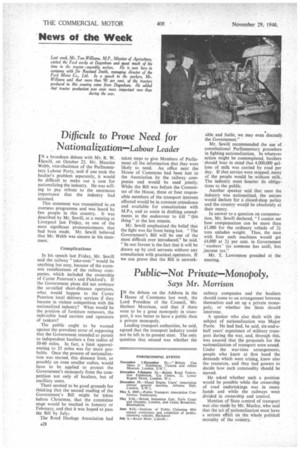Public—Not Private—Monopoly,
Page 30

If you've noticed an error in this article please click here to report it so we can fix it.
Says Mr. Morrison
I N the debate on the Address in the House of Commons last week, the Lord President of the Council, Mr. Herbert Morrison, said that if there were to be a great monopoly in transport, it was better to have a public than a private monopoly.
Leading transport authorities, he said, agreed that the transport industry could not be left in its present state. The only question that ensued was whether the railway companies and the hauliers should come to an arrangement between themselves and set up a private monopoly, or whether the State should intervene.
A speaker who also dealt with the subject of nationalization was Major Poole. He had had, he said, six-and-ahalf years' experience of military transport during the war, and, through this, was assured that the proposals for the nationalization of transport were sound. Under the war-time arrangements, people who knew at first hand the demands which were arising, knew also the resources, and they had powers to decide how each commodity should be moved.
He asked whether such a position would be possible while the ownership of road undertakings was in many hands and while the railways were divided in ownership and control.
Mention of State control of transport was also made by Mr. Maclay, who said that the act of nationalization must have a serious effect on the whole political morality of the country.
























































































